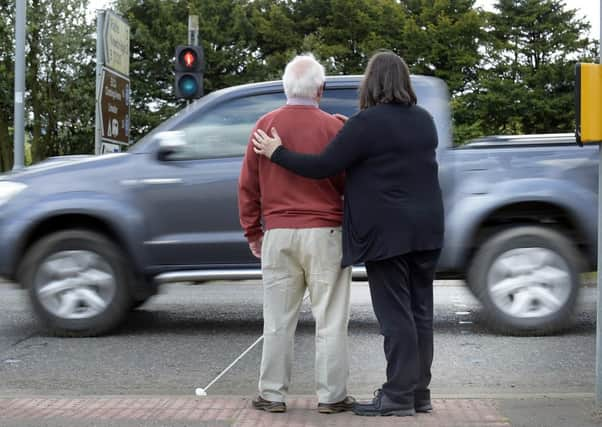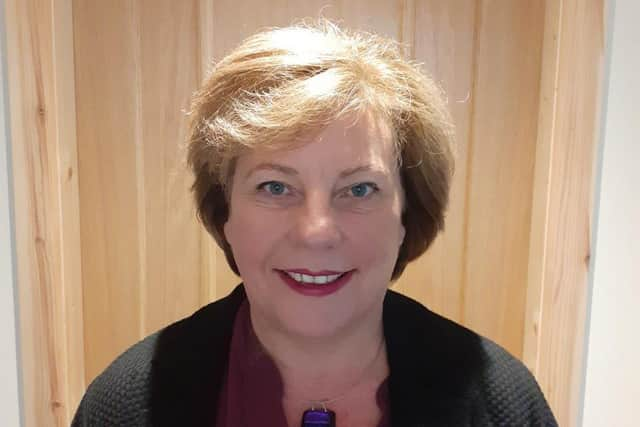Scottish War Blinded is on a mission to keep veterans smiling


It’s been a bit of a baptism of fire for Jenny Liddell, who was recently appointed as the charity’s practice lead for northern Scotland.
Jenny manages seven Scottish War Blinded outreach workers covering the Highlands and Islands, Moray, Aberdeenshire, the city of Aberdeen, Angus, Dundee, northern Fife and north Perth and Kinross.
Advertisement
Hide AdAdvertisement
Hide AdThey are part of a 17-strong outreach worker team nationwide, covering 1400 members in every local authority area in Scotland.


Outreach workers normally provide a one-to-one support service, including home visits, as well as running group activities and lunch clubs for veterans with sight loss.
Rising to the challenges of coronavirus, they have adapted to carry on supporting veterans – albeit remotely.
Jenny, who has 16 years’ experience in sensory services, has hit the ground running in her new role in these most testing of times.
Advertisement
Hide AdAdvertisement
Hide AdShe said: “Throughout this pandemic, we are staying in contact with each individual via telephone and email. Everyone we support has had a call to ensure they know they can get in touch with us to get help.
“We’ve pulled together a list of those who are at high risk and in the shielding group and those who are living alone and most vulnerable – they are getting frequent calls.
“We’re drawing up a really comprehensive resource for our staff that details all local and national support groups, so if anything changes we can quickly help them access support in their local area.
“We are still referring our existing members to Scottish War Blinded’s rehabilitation team, who are conducting telephone assessments for equipment such as magnifiers and kitchen aids which we can post out to them, as well as providing expert advice to help people maintain their independence at home.
Advertisement
Hide AdAdvertisement
Hide Ad“I have been so impressed with how strong our outreach workers’ professional relationships are with the veterans we support.”
With Scottish War Blinded’s lunch groups and activities cancelled in line with Scottish Government advice, Jenny and her team are working hard to ensure veterans supported by the charity still benefit from vital social connections.
“Prior to this pandemic, living with sight loss had already deeply affected the ability to get out and about or maintain independence for many of the veterans we support,” explained Jenny.
“Everybody is feeling it now. They are obviously concerned, but people love getting our phone calls and we’re doing all we can to keep our veterans smiling.
Advertisement
Hide AdAdvertisement
Hide Ad“One of our outreach workers came up with our non-pub quiz.
“Each has a team of six veterans they call up each week with two questions.
“Another outreach worker looked at the remaining football fixtures this season and discussed with one gentleman over the phone what he thought the results would be each week.
“As well as simply keeping in touch, we’re phoning to have a chat about something which is different tailored to that person’s interests.
Advertisement
Hide AdAdvertisement
Hide Ad“For those with access to email and social media, we’ve also been sharing online exercise classes and sessions and some of our own home made videos too.
“It’s not just people with sight loss living in the most rural areas who are struggling – many living in more urban areas are still dealing with social isolation.
“Wherever our veterans are based, we are dedicated to providing the highest levels of support at all times.It is an immense privilege to be able to make a difference to veterans with sight loss.
“When the country comes through these extremely challenging times, I look forward to finally meeting our veterans in person – and my new outreach colleagues – and developing even more new partnerships.”
Advertisement
Hide AdAdvertisement
Hide AdRebecca Barr, the charity’s director of services, was delighted to welcome Jenny and praised the outreach team’s dedication.
She added: “Our veterans need us now more than ever so we’re working hard to ensure each and every person we support knows they are not alone and is getting the help they need.
“It’s vital that we continue to combat social isolation remotely throughout this difficult period when many could be feeling this even more acutely.”
Helping veterans for 105 years
Scottish War Blinded was founded in 1915 when the Royal Blind decided to take steps to help veterans blinded during World War One.
Advertisement
Hide AdAdvertisement
Hide AdA committee was set up that recommended the establishment of a centre, Newington House, to provide rehabilitation and training to blinded soldiers and sailors.
In 1928, Scottish War Blinded purchased premises at Number 2 Queen’s Crescent, Glasgow, providing vocational skills training and permanent employment for members in cane weaving, mat-making and boot repairing.
Although non-residential at Queen’s Crescent, the initiative allowed many members in the west of Scotland to secure a wage without the need to travel great distances and enjoy the same camaraderie experienced at Newington House.
In 2007, Scottish War Blinded expanded its free membership provision to support veterans who developed a visual impairment after their service.
Advertisement
Hide AdAdvertisement
Hide AdSo the charity now gives free support to former servicemen and women of all ages, no matter if they lost their sight during or after service, including National Service.
The majority of veterans currently benefiting from its services actually developed sight loss as a result of age related conditions, such as macular degeneration.
Support can include:
Rehabilitation and training to adapt to sight loss;
Grants for equipment to assist with independent living;
Funded respite care;
Home modifications;
Recreation and social activities.
The charity also has two centres, Linburn in Wilkieston and Hawkhead in Paisley.
For more information about support for veterans call 0800 035 6409 or visit www.scottishwarblinded.org.